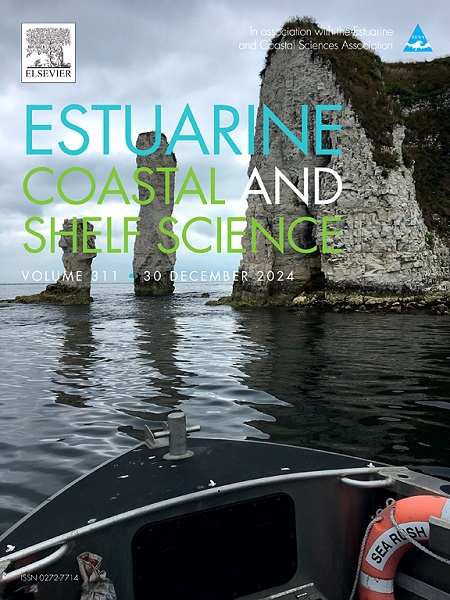东北大西洋气候变化导致的鱼类分布变化:在海洋-河口机会物种中使用分层过滤方法
IF 2.6
3区 地球科学
Q1 MARINE & FRESHWATER BIOLOGY
引用次数: 0
摘要
海洋-河口机会鱼类(MEO)是指出现在大陆架上,以河口和/或浅海沿岸地区为育苗场的鱼类。这些具有重要商业价值的资源正面临着直接和/或间接人为气候变化影响所造成的重大环境变化。在这项研究中,我们调查了预计 21 世纪末东北大西洋六种主要海洋生态系鱼类的海洋环境适宜性分布变化(即范围大小、重心和边缘)的方向性和幅度。在本研究框架内,我们区分了 "亚寒带 "和 "亚热带 "物种。采用 "分级过滤器 "概念来模拟潜在的物种分布,并将 i) 生物气候模型和 ii) 生境模型的预测结果结合起来。生物气候模型基于大尺度且随时间变化的变量,而生境模型的变量则是细粒度且随时间变化的。我们对政府间气候变化专门委员会(IPCC)的两种情景进行了测试:中间情景(SSP2-4.5)和悲观情景(SSP5-8.5)。我们利用生物多样性出现的国际数据库、产生共识预测的集合预测以及创新的分布变化指数来应用这一框架。根据预测,我们研究区域的所有六个物种都将发生明显的西北迁移。然而,"亚热带 "物种的北移幅度大于 "亚寒带 "物种,这是因为重心移动和边际移动的速度更快。这些分布范围的变化可能会对生态产生重大影响(如河口和沿海育苗场的繁殖变化以及产卵场的变化),从而改变种群的连通性。本文章由计算机程序翻译,如有差异,请以英文原文为准。
Fish distribution shifts due to climate change in the Northeast Atlantic: Using a hierarchical filtering approach on marine-estuarine opportunist species
Marine-estuarine opportunist (MEO) species are fish that occur in the continental shelf and use estuaries and/or shallow coastal areas as nurseries. These commercially important resources are facing significant environmental modifications caused by direct and/or indirect anthropogenic climate change effects. In this study, we investigated the directionality and the magnitude of the distribution shifts (i.e., range size, gravity centroids, and margins) in marine environment suitability for six main MEO fish species within the Northeast Atlantic expected for the end of the 21st century. In the framework of this study, we have distinguished ‘sub-boreal’ from ‘sub-tropical’ species. The ‘hierarchical filters’ concept was adopted for modelling the potential species distributions and combined the predictions of i) a bioclimatic model with ii) a habitat model. The bioclimatic model is based on large-scale and time-variant variables while variables of the habitat model are fine-grained and time-invariant. Two Intergovernmental Panel on Climate Change (IPCC) scenarios are tested: an intermediate (SSP2-4.5) and a pessimistic one (SSP5-8.5). We applied this framework using international databases of biodiversity occurrences, ensemble forecasting producing consensual predictions, and innovative indices of distribution shifts. A visible north-westward shift was predicted for all six species in our study area. However, the northward expansion was greater for ‘sub-tropical’ than for ‘sub-boreal’ species due to faster gravity centroid displacement shifts and faster margins shifts. These range shifts may lead to major ecological impacts (e.g., changes in recruitment to estuarine and coastal nurseries, as well as changes in spawning grounds) that may alter populations' connectivity.
求助全文
通过发布文献求助,成功后即可免费获取论文全文。
去求助
来源期刊
CiteScore
5.60
自引率
7.10%
发文量
374
审稿时长
9 months
期刊介绍:
Estuarine, Coastal and Shelf Science is an international multidisciplinary journal devoted to the analysis of saline water phenomena ranging from the outer edge of the continental shelf to the upper limits of the tidal zone. The journal provides a unique forum, unifying the multidisciplinary approaches to the study of the oceanography of estuaries, coastal zones, and continental shelf seas. It features original research papers, review papers and short communications treating such disciplines as zoology, botany, geology, sedimentology, physical oceanography.

 求助内容:
求助内容: 应助结果提醒方式:
应助结果提醒方式:


